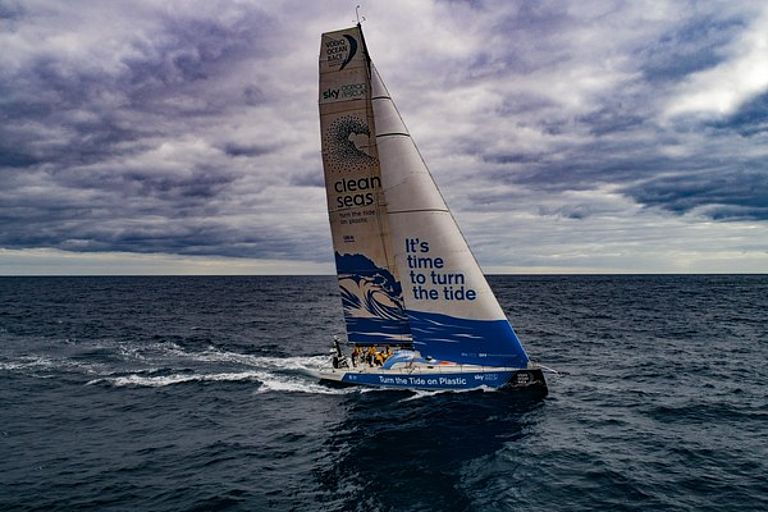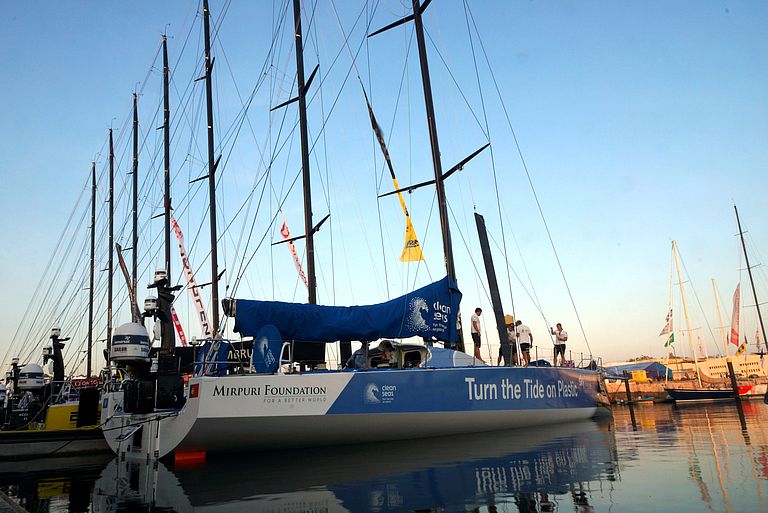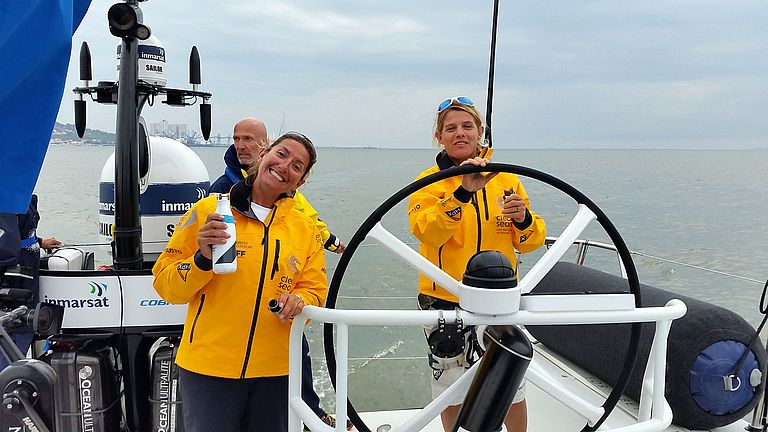Round-the-World Regatta: Science wins
GEOMAR equips Volvo Ocean Race yacht with sensors for ocean observations
(Joint press release of the GEOMAR Helmholtz Centre for Ocean Research Kiel and the Kiel Cluster of Excellence "The Future Ocean")
On Sunday, seven high-tech racing yachts started from Cape Town heading to the Southern Ocean. It marked the beginning of one of the toughest legs of the around the world Volvo Ocean Race (VOR). The next destination is Melbourne in Australia. In order to sail the 6,500 nautical miles (approx. 12,000 kilometers) as fast as possible, the high-speed boats will use the ‘roaring forties’, a zone of extreme westerly winds around 45S.
But whoever wins this leg—and at the finish the entire regatta—science will definitely be on the po-dium as this year the VOR has provided some of the participating boats as research platforms. Researchers of the GEOMAR Helmholtz Centre for Ocean Research Kiel and the Kiel cluster of ex-cellence “The Future Ocean”, with support from Volvo Cars, are taking part and have equipped the yacht “Turn the Tide on Plastic”, skippered by the British Dee Caffari, with a set of ocean sensors.
These devices collect basic chemical and physical seawater data as well as the distribution of microplastic particles in the ocean. "This gives us a unique global record of the state of the seas," says Dr. Toste Tanhua, project manager and scientist in GEOMAR’s department of Chemical Oceanog-raphy.
On the first two legs of the VOR from Alicante to Lisbon and from Lisbon to Cape Town, Kiel researchers' sensors have already been used on the “Turn the Tide on Plastic” yacht. “These two legs were important for us to test whether or not the technology works under the harsh racing conditions," explains Dr. Sören Gutekunst, supervising scientist from GEOMAR.
Actually, underway measurements are already routine for the oceanographers from Kiel. For many years they have equipped a cargo ship that commutes regularly between Europe and the USA with sensors. The aim is to measure carbon dioxide and other climate-relevant gases in the North Atlantic. "But ocean-going racing yachts are sports equipment trimmed for maximum speed. Classical underway systems are not suitable for the deployment onboard VOR yachts, because they are too bulky, too heavy and consume to much energy,” explains Dr. Gutekunst. The Kiel based company SubCtech had been experiences with the development of compact underway systems and adapted their system according to the specifications of VOR. A second Kiel based company (bbe Moldaenke) joint the consortium and developed a system for measuring micro particles in the surface ocean.
The development work is now paying off because the technology has proven itself in the first legs of the VOR. "The current race from Cape Town to Melbourne will be particularly interesting for us," says Dr. Tanhua, “because now the teams sail through areas of the Southern Ocean, which even research vessels rarely reach and are therefore rarely sampled directly."
At several of the host cities along the route the VOR organizes an Ocean Summit, where Toste Tanhua and other scientists will present their preliminary results. In Melbourne, the racing yachts are expected in late December. “The preliminary analysis of data and samples from the first legs through the Mediterranean and the Atlantic has shown high microplastics concentrations. We are very curious what we will find in the Southern Ocean," emphasizes Dr. Gutekunst. The results will also contribute to the Horizon2020 project AtlantOS, which aims at a better ocean observation in the Atlantic Ocean.
Anyone who wants to learn more about the VOR from a scientific perspective can follow the "Oceanographic Observation from Volvo Ocean Race Yachts" blog. Dr. Gutekunst writes about the current events during the VOR and the latest scientific results. The blog can be found at http://www.oceanblogs.org/oceanobsvor/
High-res images:
The "Turn the Tide on Plastic" on her way to the Southern Ocean. Photo: Jeremie Lecaudey/Volvo Ocean Race (a high-res version of this image is available on the Volvo Ocean Race website)
The yacht "Turn the Tide on Plastic" is taking part in the Volvo Ocean Race and is collecting physical and chemical data as well as information on microplastic distribution through the ocean. Photo: Sören Gutekunst, GEOMAR
Dee Caffari (left) is the skipper of "Turn the Tide on Plastic. Boat captain Liz Wardley (right) looks after the scientific devices during the races. Photo: Sören Gutekunst, GEOMAR
Kontakt:
Jan Steffen (GEOMAR, Kommunikation & Medien), Tel.: 0431 600-2811, presse(at)geomar.de





